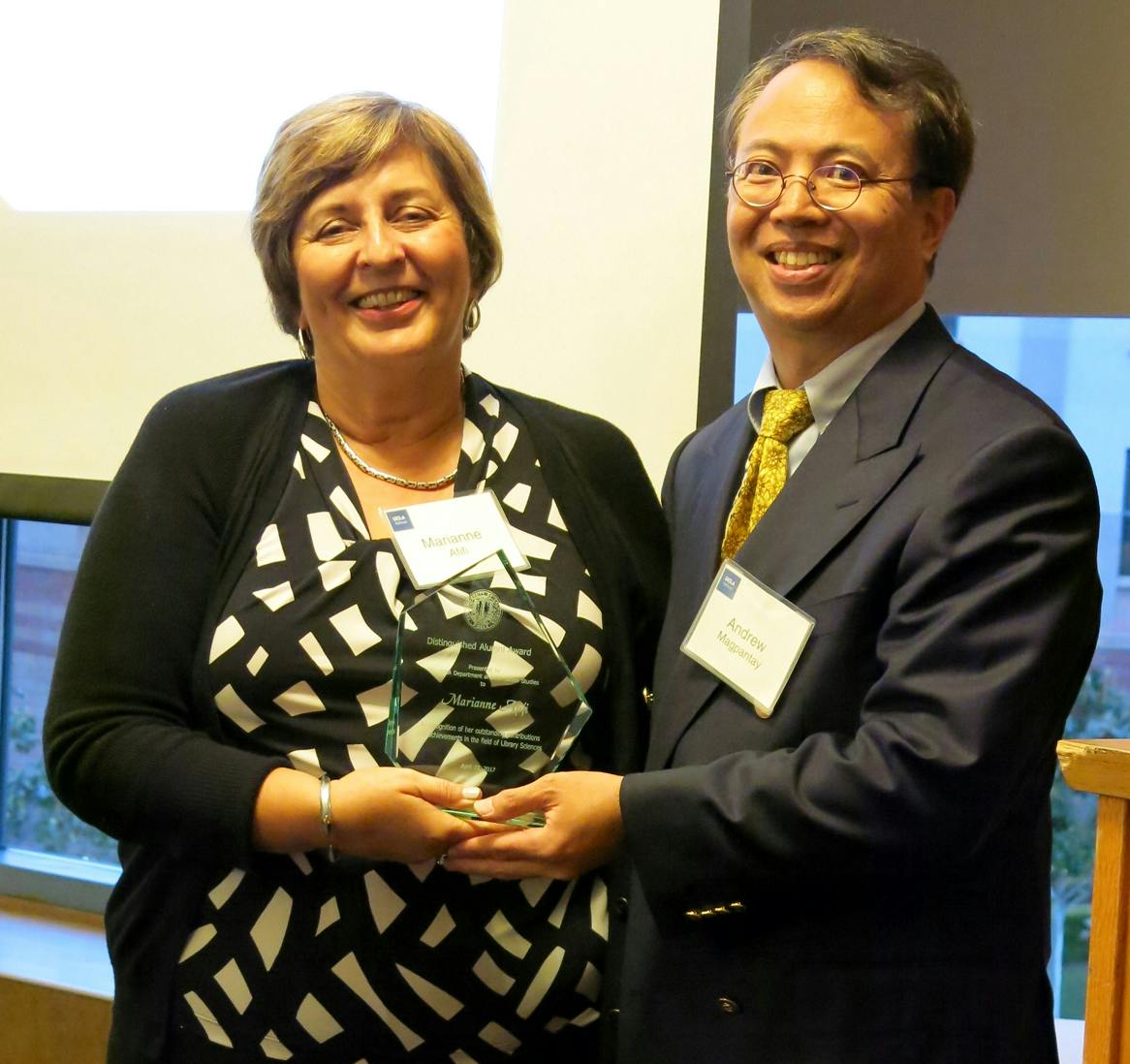Marianne Afifi (’93, MLS) recalls the excitement that she and her colleagues at USC’s Center for Scholarly Technology experienced in the early 1990s, as they discovered what were then groundbreaking digital innovations.
“Every day there was something new,” says Afifi, who was honored with the Distinguished Alumni Award this year by the UCLA Library & Information Studies Alumni Association (LISAA). “I’ll never forget [discovering] Mosaic. We all crowded into the office of one of the programmers and looked at this, the first [graphical] web browser. I also remember when our library catalog went to a web platform. We were just like kids in a candy store, because all of a sudden, we were able to bring information more easily to people. We had a foot in the library and a foot in IT which allowed us to teach faculty and students what it was all about.”
Afifi was part of a steering committee to establish a partnership for a grant proposal in 2014, headed by the USC Libraries with CSU Northridge, and the Autry Museum of the American West that would provide on-the-job training for recent archival studies graduates and an archival workforce for USC’s LA as Subject initiative.
“There are more than 200 archival collections that have something to do with Los Angeles,” says Afifi. There are many small archives that needed help, but they didn’t have any jobs available. We tried to make a connection [between] all these archivists who are fresh out of school and people who need somebody with [professional] training to work on these archives. It was very successful.”
Afifi says that careers in the archival fields are vital and varied, with opportunities in the realm of performing arts, business, medicine, and beyond.
“It’s important for libraries and other institutions like historical societies and museums to have archivists to basically manage [these holdings],” she says. “But archives are unique for each institution. Therefore, you need professionals to work on them and to promote these unique holdings.”
Afifi says that the digital world has expanded interest in archives, and provides a convenient and efficient way for scholars, researchers, and the public to preview or use online holdings.
“There are people who come to an archive or who will spend a whole summer looking at one, working on a book, or doing research,” says Afifi. “Often, these archives are somewhere else, and they have to travel. If [archivists] just digitize some of the holdings, people can have a better idea of what it is. It’s not the same as holding an original [document or photo], but it is important for people to know what is there and what they can expect.”
The last innovative project that Afifi oversaw before retiring as associate dean of CSUN’s Oviatt Library last year was the creation of The Learning Commons. The expansion of the library provides a variety of technological services to the approximately 40, 000 students, including a creative media studio, tablet and laptop checkout, a 3-D printer, and a variety of study spaces to suit different students’ needs. In addition, librarians offer a variety of classes for CSUN students on how best to use the new technology to enhance their learning.
“There were physical changes but also programmatic changes,” notes Afifi. “The librarians conducted surveys to find out what students wanted and it is very student service-oriented.”
Afifi says that her education from UCLA IS gave her a good foundation to become a library administrator.
“There were people who were working in a library while they were in the program and I learned a lot about libraries from them,” she recalls. “I remember that many of my fellow students complained about how theoretical some courses were, but I think you need… the theoretical underpinnings of a profession.”
Afifi says she is honored to have been recognized by LISAA and the UCLA Department of Information Studies with the Distinguished Alumni Award.
“I’m so happy to have received this award and to still have a connection to UCLA,” says Afifi. “It feels like my home here, and I always wanted to keep that connection. Christine (Borgman) and I are friends. Elaine Svenonius was a great professor. I keep in touch with people that I meet through LISAA and at conferences. For me, there has always been a sense of community.”
While growing up in Vienna, Afifi went to the library every week with her mother, who read voraciously.
“Many European libraries have closed stacks – you don’t just go there and pick something out,” she says. “The librarian knew my mother and would pick things out for us. I can’t remember not reading a lot. When I was a kid, we always had a discussion about how long I was allowed to stay up to read.”
While Afifi no longer reads with a flashlight under the covers, she retains the level of curiosity she had as a child – and has enjoyed a career helping others to do the same.
“When I actually got into the field, the exciting thing to me was the technology,” she says. “I was always good with technology but I didn’t want to become a programmer. I wanted to have contact with people and I was interested in how technology made it easier to find information.
“When I was a kid, I was always wondering about this and that. I’d ask my parents and they’d have to find a book about it. It’s a delight to be able to find things so quickly now.”
Above: Marianne Afifi (’93, MLS) received the Distinguished Alumni Award from the UCLA Library & Information Studies Alumni Association at the organization’s Spring Dinner on April 25. Pictured with Andrew Magpantay (’86, MLS), LISAA Board Member.
